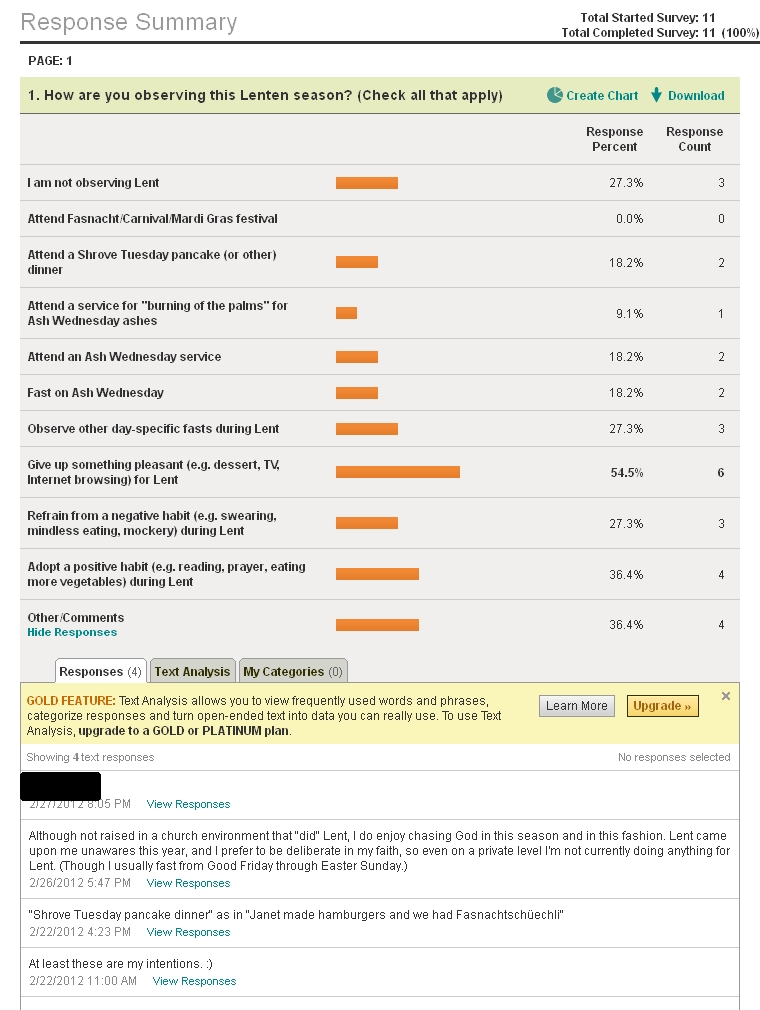Here are the results of my trial of SurveyMonkey, which, by the way, I think is pretty cool and hope to find more uses for. I have closed the survey, as there has been plenty of time to respond for those who wish to, and I'm starting to get spam. (That's why one of the comments has been blacked out.)

I considered blacking out the name in the second comment from the bottom, but "Fasnachtschüechli" is as good an identifier. :) That's as close, I note, as anyone got to a Fasnacht/Carnival/Mardi Gras festival. I missed Zurich's by a few days. (But I did enjoy Fasnachtschüechli!)
Thanks to everyone who participated!
Permalink | Read 2275 times | Comments (2)
Category Just for Fun: [first] [previous] [next] [newest]
For six weeks in Switzerland I was the official dishwasher, and enjoyed it. In my appliance hierarchy, a dishwasher ranks below a microwave; chiefly, I'm afraid, because without the latter it's a pain to heat up my cup of tea, which I'm forever leaving somewhere to get cold. Nonetheless, I am inordinately thrilled by one of the first purchases we made upon my return: a Bosch dishwasher, not the top of the line but not the bottom, either.
Our old dishwasher (GE "Potscrubber 1200") didn't owe us a thing, having served us well for a quarter of a century. The cost, spread over time and ignoring inflation, was less than $20 per year.
Does anyone expect an appliance to last 25 years anymore? Believe it or not, the dishwasher was not our oldest appliance, either: we've had our stove and freezer since 1977! The freezer is as good as ever, if you don't count the cosmetic angle; the stove is limping somewhat, but all four burners, the oven, and the microwave still function well. On the positive side, the short life of today's appliances makes one aspect of shopping easier: if you decide you don't like what you bought, you don't have as much time to wait before getting another chance.
For the most part, I loathe shopping and the decision-making that goes with it. Thankfully, my wonderful husband did the preliminary research while I was washing dishes overseas, so the remainder of the process was almost painless. We went with the Bosch on our brother-in-law's recommendation—in his business, he learns a lot about such things—as well as for its German engineering. That it was made in North Carolina is nice, too. We bought it from Lowe's and were very pleased with the installer (who is also an amateur luthier, we discovered). We've had the new machine for four days, and here are a few things I've noticed that are different from our previous dishwasher.
- It's much quieter. We chose not to get the model with a delayed start option, because this is so quiet there's no need to wait to run it, even if you have company or are watching a movie.
- The cleaning process is much longer. In this it is much like European clothes washers, which favor low water consumption over quick work. So far it has not bothered me that it takes over two hours to wash the dishes. There is an express (30-minute) cycle I can use if necessary.
- The default settings include an "I'm done, come unload me" set of five loud, nagging beeps, which repeat at intervals—I don't know for how long, as I've not yet been able to ignore it past two sets. There's a way to turn the volume down, or off altogether, which I may resort to, as the beeps sound like an alarm clock, not what I want to hear at midnight when I'm deep in slumber.
- Ta-da! I've saved the best for last: The dishes get CLEAN! For reasons unknown, our old dishwasher never really worked right after we returned from our two years in Boston. We nursed it along—for years, really—trying one thing and another, with varying success, but finally threw in the towel. Hence the new dishwasher. Since the new models are designed to function better if you don't rinse the dishes first, I'm having to change my well-ingrained habit of getting them pretty much clean beforehand. (To quote the Bosch rep, "It's a dishWASHER; let it do its job.") We're still testing its limits, and marvelling at the clean dishes.
Permalink | Read 2576 times | Comments (3)
Category Everyday Life: [first] [previous] [next] [newest]
Here she is, the incredible Ashley Locheed! On the right is some dude named Englebert Humperdinck. (Not the composer of Hänsel und Gretel.) The venue is in Singapore.
Permalink | Read 2885 times | Comments (0)
Category Everyday Life: [first] [previous] [next] [newest]

Everybody's Normal Till You Get to Know Them by John Ortberg (Zondervan, 2003)
This book started off with two strikes against it, but survived.
First, it was recommended as a “must read” from someone I care about, and coupled with a feeling of time pressure, which in my oddball psyche immediately sets up a cycle of resistance followed by guilt leading to more resistance, etc. Don’t ask me why, but I’ve been like that as long as I can remember. It was decades before I discovered that most of the books recommended to me, as a child, by my parents were really good stories. I was out of school before conceding that some (not all) of the books I was forced by my teachers to read were actually interesting. And I still haven’t finished Colossians Remixed, which I started in 2005…. Stupid, I know. It's not that I don't ever take other people's reading recommendations; many of my favorite books I learned about from someone else. But for whatever reason, obligation + time pressure = irrational barrier.
Second, I realized immediately that it is written in a style I cannot stand, which I call “modern American evangelical pop culture,” though I suspect it’s much more widespread than that. It’s annoying enough that magazine articles use pull quotes and sidebars, which make sustained reading difficult by distracting from the main text, but I find it inexcusable in book format. Ditto the dumbed-down writing, and the highly informal style, more appropriate for blogs than for books.
Despite these annoyances, I finished the book and am glad I read it. The first hurdle was easy to overcome because I was reading a borrowed book with a fixed return deadline. My breakthrough with the second was a stunning realization that I hope will aid me in appreciating more books written in this (all too common) style. (More)
Today's Stone Soup:
Less on the Scrabble side, more on the Boggle side—when you have meals to fix and children to tend, long games don't work well—but this is my family! I don't know Words with Friends; can anyone enlighten me?
Permalink | Read 3148 times | Comments (3)
Category Everyday Life: [first] [previous] [next] [newest] Just for Fun: [first] [previous] [next] [newest]
This survey has no purpose, other than to let me try out SurveyMonkey.
There's supposed to be an embedded survey below. [Update: there isn't.] If not, you can (supposedly) participate by clicking on this link: Take our Lenten Practices Survey now.
A few things I think I'm supposed to add:
- This survey is not intended for respondents under the age of majority in their own country (or 13 years of age in the U.S.). [I don't like age discrimination any more than the next person, but this is legal stuff. Have a parent fill it out for you. Not that I think anyone under 13 is reading my blog.]
- Please be advised that your responses to this survey may not be treated as anonymous by the survey sender. [This means that theoretically I might be able to figure out who you are from your IP address or something. If that bothers you, don't answer.]
- For general privacy concerns, read the SurveyMonkey Privacy Policy [It's actually pretty clear, as these things go.]
- You can create your free online surveys with SurveyMonkey, the world's leading questionnaire tool.
Permalink | Read 2650 times | Comments (5)
Category Just for Fun: [first] [previous] [next] [newest]
Which is worse, losing your technical edge, or losing your technical edge and pretending you didn't?
When I was young, "Made in Japan" implied useless, cheap, junky. I'm thrilled that it now means quite the opposite. Excellence is a good thing, and I see no reason to mourn when other countries compete at our level or even best us in some areas. A little competition keeps us on our toes.
But why does it take innovations from Japan so long to cross the Pacific?
When Janet lived and worked in Japan for a year, she noted that home computers were much less common than in America. I was surprised this was the case for such an advanced nation, but then again, most people don't have clothes dryers there, either. What did surprise me was to learn that in this Japan was not behind America, but ahead. Most Japanese did not need personal computers because they did nearly everything they wanted to on their mobile phones. They accessed the Internet; they paid their bills; they read and composed their e-mails. This was in 2005, years before smartphones took America by storm.
Then there were the toilets. Ever since we visited Janet in Japan I have been wondering why Home Depot doesn't sell Japanese toilets. Now, finally, the National Association of Home Builders includes one in this years showcase home. But why does this review from the Orlando Sentinel pretend it's a new, American invention?
I cannot get the toilet in the master bath out of my mind. Kohler clearly has some smart woman on its design team, because, ladies, this commode is for you.
At the touch of a wall-mounted LED pad that looks like an iPhone, you can auto-magically raise and lower the lid without touching it. That right there is better than a European vacation. And you can heat the seat (men, you will never understand), and play music. Not only that, this smart piece of plumbing sprays, dries and has adjustable flushing. From what I can tell, this toilet of tomorrow does everything but send a urine sample to the lab.
I"m glad American companies are catching on. But what took them so long? And why do we pretend things are new and amazing when they've been around elsewhere for years?
Permalink | Read 2172 times | Comments (0)
Category Random Musings: [first] [previous] [next] [newest]
From this distance, I find it difficult to remember what our children did when. But today I delved back into past diaries, looking for information on when it was we bought our current dishwasher. (More on that in a later post.) Here is something amusing I found:
[Today] Janet had her kindergarten registration. [The first grade aide] filled out [her] card, and when Janet not only knew her phone number and address with zip code, but also spelled "Wightman" for her, she said, "I guess you're ready for kindergarten!"
I had not remembered that Janet could spell her last name before going to kindergarten, I but I guess that when you have a name that everyone misspells, you learn to spell it early. She would have heard her parents answering the "What is your name?" question enough times that for all I know she thought her name was really "Janet Wightman W-I-G-H-T-M-A-N"!
Permalink | Read 2496 times | Comments (2)
Category Everyday Life: [first] [previous] [next] [newest]
I can't be griping all the time. Here's some great news for homeschoolers—and others who don't fit in the standard school model—who have suffered, as we did, from age discrimination by community colleges. Here are some excerpts from the encouraging story in tomorrow's Orlando Sentinel. (I know. Don't ask me why a column dated February 19 is available on the 18th, but it is.)
Two years ago, [Lake-Sumter Community College] refused to admit as a dual-enrollment student a then-12-year-old Center Hill girl who was more than academically qualified to study at the two-year community college. Instead of enthusiastically embracing Anastasia Megan, a brilliant young woman home-schooled by her parents, college administrators took the most backward stance imaginable and fought to keep her out.
The U.S. Department of Education's Office for Civil Rights in Atlanta, to whom Annie's family complained, recently closed the matter after LSCC eliminated its age requirement, trained employees to stop discriminating and offered Annie a chance to apply.
However, by the time LSCC offered to consider Annie in July 2011, it was clear that her course of study already had outstripped what the community college could provide. Starting in August, Annie, now 14, and another of the triplets, her brother Zigmund, will attend Queens University in Ontario, Canada. She was among 300 successful applicants to the college of business and commerce from a field of 5,000. ... Annie's brother is entering the university's engineering school (Annie's second choice), and the third triplet, Elizabeth, is enrolled in a high-school International Baccalaureate program.
[S]uch a ruling by the Office for Civil Rights is likely to have an effect on community colleges statewide. It's all about access in community colleges, and that's the way it ought to be. The Megan family neither asked for nor received a nickel in damages. The Megans didn't hire a lawyer. LSCC, however, spent about $12,000 on attorney fees fighting to discriminate against a kid whose achievements were remarkable. Asked why the college ever would fight to keep any student out, [College President Charles Mojock] said: "That was then, and this is now. We live and learn too."
After six nephews, four grandsons, and 29 years, we once again have two little girls who fit these adorable outfits. Picture credit for the second goes to Heather and Jon Daley; the first is scanned from an old, washed out Polaroid-style print, but you get the idea.
Janet and Heather, December 1982
Joy and Faith, January 2012
Permalink | Read 2544 times | Comments (4)
Category Children & Family Issues: [first] [previous] [next] [newest]

Brave Companions: Portraits in History by David McCullough (Simon & Schuster, 1992)
I need to remember to read more from David McCullough. The man can write.
Brave Companions deserves a long, thoughtful review. I could write a blog post on any and all of these fourteen portraits (thirteen of people, one of a city) and three additional essays. McCullough draws stunning pictures of people—famous and unknown, artists and aviators, writers and scientists—whose actions and personalities made (and are making) history.
But I barely had time to read the book, let alone write about it, and I must now return it to its rightful owner. If you, however, find yourself with sufficient time to enjoy a short book (232 pages) that's easy to read in short bursts (except that you won't want to put it down), you can't go wrong with Brave Companions.
I'd read it for the writing alone; the history, personality, and adventures are a bonus.
On Monday, Vivienne received the blessing of the Swiss government; today we travelled to the American Embassy in Bern for a simlar benediction from the United States. As I did when Joseph was born, I came along to hold diaper bags and other items not allowed in the embassy, which includes purses (or bags of any sort) and cell phones (or electronics of any sort). Fortunately, winter coats were acceptable, as were a couple of diapers stuffed in the pockets.
Really, it's a very un-welcoming experience, a visit to this little bit of American soil in Switzerland. Embarrassing, when you think of the impression we are making on others. (Okay, so Hollywood does a worse job, but at least they're not official.) There is no waiting room, unless you count the small antechamber outside, where those waiting in line are subjected to the summer's heat or winter's cold—though a roof provides some protection from rain, if it isn't too windy.
But we were prepared. Joseph and I were well-dressed, and had the stroller with us. As soon as Vivienne and her parents passed through the security check, he and I started out on our adventure. (More)
I'll never convince a credit-card wielding American, but shopping with cash in a country like Switzerland is great! I'll admit that I love the convenience of credit cards, mostly for online purchases, buying gas (drive in, swipe the card, pump, go), and the neatly organized monthly statements. And, of course, never worrying about having enough cash at the grocery store.
That last is part of the problem. With cash, I see the exact cost of what I'm buying. There's something visceral about handing over the bills and coins. The money I had, I no longer have. And if I don't have enough, I have to put something back on the shelves and buy it later, or never. I have no statistics to back up my assertion, but I'm absolutely certain that I spend more money, more freely, since we moved away from making most of our purchases with cash.
What's especially nice about using cash in Switzerland, however, is their system of coins and currency. The smallest bill is the 10-franc note; coins come in 5-, 2-, 1 and 1/2-franc denominations, plus 20-, 10- and 5-rappen (cents). Note that there is no 1-rappen coin. This makes calculations very easy, especially since any taxes are hidden in the price of the item. What you see is what you pay. With only multiples of five to worry about, it's very easy to keep a running total of the cost of what's in my cart. Therefore, before the checkout clerk has finished scanning my items, I know what the total is going to be, and with what combination of bills and coins I plan to pay. And I know exactly how much change I should receive.
I find that extremely satisfying. I'm not good enough with mental arithmetic to bother with it at home. Let's see: 14.88 plus 5.54; that's uh, um, oh something more than $20. Hmmm, should I buy orange juice at $3.99 or grapefruit at $3.85? How much are tomatoes per pound today? Do we need mayonnaise? Oh, bother, I've forgotten the total. And even if I remember it, I know that when the clerk is done ringing up my order, she's going to add an awkward 7% sales tax, but only to certain items, and I'm never sure just which ones. So I meekly hand over my credit card and hope every part of the system is honest, accurate, and not broken down.
Cash - multples of five - clear pricing. What an empowering combination!
There's some debate just what Emmen is. Stephan says it's a suburb of Luzern, and I suppose it is, Luzern being a 15-minute bus ride, or an even shorter train ride, away, which we proved today when Vivienne acquired her Swiss passport. But it hardly has a "suburban" feel, at least as I know suburbs. For one thing, there's decent public transportation—but that's no doubt because it's Swiss. For another, most people live in apartments, which says "city" to me, though Janet says that is also a Swiss characteristic, city or no. There's traffic. There's industry. There are plenty of stores, but no strip malls (though there is a mall or two). Everything is close together, and what yards there are, are tiny. Children walk to school. Janet walks to the grocery store (actually, several grocery stores), the train station, the above-mentioned malls, the swimming pool complex, and church. That feels like a city to me.
And yet.... Emmen certainly isn't a city like Basel, or Luzern, with a lively city center, and centuries of history and culture. And it has a rural feel, as well. Also within easy walking distance is a long hiking trail along the river (pedestrian, bike, and also equestrian in most places). The trail runs through wooded areas where trees are still being harvested by loggers.
(Switzerland is a great place for hiking trails. There's one that leads all the way into the city of Luzern; we had planned to hike it today, but the -9 degree Celsius temperature was a deterrent. Perhaps we should have taken advantage of such balmy weather, though: tomorrow's high is supposed to be -10, with a wind chill of -16 (that's 3 degrees Fahrenheit).
There are also several small farms nearby. One of Joseph's favorite walks is to the see the cows and goats at the nearest dairy farm, where for a single franc we pick up a liter of fresh, delicious, raw milk. (Click on the pictures to enlarge.)
So, what is Emmen? Whatever it is, it's like nothing in the United States that I know of.
Lately it's looked a lot more like picture-perfect Switzerland, thanks to the snow and cold. Except that it could be picture-perfect New York, or Pittsburgh, or Minnesota, because even today, when the sun came out, the Alps were obscured by low clouds.
Weather or no, Joseph likes to be outside. He loves the snow, which he calls "no," except when talking to Bappe (Daddy); then he says "nee" (Swiss German "Schnee").
On our walk the other day I'd intended to get some video footage of him playing in the snow, but he kept getting distracted by airplanes and other vehicles.
What may not be obvious is why he suddenly stops in the middle: his hat catches on an overhanging branch. After breaking loose, he's a bit unhappy—until another airplane comes by.
Permalink | Read 2689 times | Comments (1)
Category Children & Family Issues: [first] [previous] [next] [newest]







